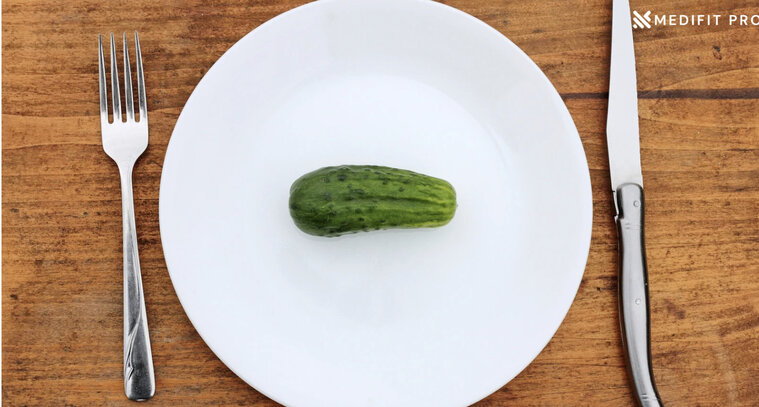Losing weight can be a challenging journey, and with so many myths floating around, it can be difficult to know what information to trust. Whether you are looking to lose a few pounds or embarking on a significant weight loss journey, it’s important to separate fact from fiction. In this article, we will dispel 20 of the most common weight loss myths and provide you with the truth behind each one.
Myth#1 Crash diets are an effective way to lose weight.
Fact: Crash diets promise quick results but often leave you feeling deprived and fatigued. These diets are often low in calories, carbohydrates, and essential nutrients, making it difficult to stick to the diet long-term. Furthermore, crash diets can lead to rebound weight gain as soon as you stop following the diet.
Myth#2 Scale is the only indicator of weight loss.
Fact: The scale is not the only indicator of weight loss success, and it’s possible to lose weight and not see a change on the scale. This is because muscle weighs more than fat, and if you’re building muscle through exercise while losing fat, you may not see a change in your weight. Additionally, other factors, such as water retention, can affect your weight. To track your progress, it’s important to use a combination of tools, including the scale, measuring tape, and progress photos, as well as tracking changes in your body measurements and energy levels.
Myth#3 Carbs are the enemy of weight loss.
Fact: Carbs are not inherently bad and are an essential part of a healthy diet. It’s the type and amount of carbs you eat that affects weight loss. Complex carbohydrates, such as whole grains, fruits, and vegetables, provide fiber and essential nutrients, while simple carbohydrates, such as sugar and processed foods, can contribute to weight gain. Focus on eating a balanced diet that includes a variety of carbohydrates, including both complex and simple carbs, in moderation.
Myth#4 Weight loss is all about counting calories.
Fact: Counting calories is a useful tool for some people, but it’s not the only factor that affects weight loss. The quality of the calories you eat, as well as your physical activity level, plays a significant role in weight loss. Focusing solely on calorie counting can lead to an unhealthy relationship with food and neglect of important nutrients.
Myth#5 You have to exercise for hours every day to lose weight.

Fact: Intense exercise is not necessary for weight loss. In fact, incorporating moderate physical activity, such as 30 minutes of brisk walking, into your daily routine can be more effective for weight loss than long hours of intense exercise. The key to weight loss is finding an exercise routine that is sustainable and enjoyable for you. To know more about motivation for exercise, click https://medifitpro.com/weight-loss/how-to-stay-motivated-for-exercise/
Myth#6 Weight loss supplements are a quick fix.
Fact: Weight loss supplements can be tempting, but they are not a magic solution to weight loss. Many supplements are not regulated by the FDA and can contain harmful ingredients that can be dangerous to your health. The best way to lose weight is through a balanced diet and physical activity.
Myth#7 Fad diets are a safe and effective way to lose weight.
Fact: Fad diets often promise rapid weight loss, but they are not based on scientific evidence and can be harmful to your health. Furthermore, following a fad diet can lead to weight gain as soon as you stop following the diet. A balanced diet that includes a variety of healthy foods is the best way to lose weight and maintain it in the long term.
Myth#8 You can target specific areas of your body for weight loss.
Fact: Unfortunately, you can’t choose where your body loses weight first. Spot reduction, or targeting specific areas of your body to lose weight, is not possible. Weight loss occurs when you burn more calories than you consume, and it happens all over your body, not just in specific areas. Focus on a balanced diet and regular physical activity to achieve overall weight loss, and remember that it’s normal for weight loss to occur at different rates in different areas of your body.
Myth#9 You should avoid all fat if you want to lose weight.
Fact: Fat is an essential part of a healthy diet, and certain types of fat, such as unsaturated fats, can actually help with weight loss. Rather than avoiding all fats, focus on eating healthy fats, such as those found in avocado, nuts, and olive oil, and limiting your intake of unhealthy fats, such as trans fats and saturated fats.
Myth#10 Weight loss is a linear process.
Fact: Weight loss is not a straight line and can vary greatly from person to person. It is normal to experience plateaus and setbacks along the way, but it’s important to keep in mind that weight loss is a journey and progress can be slow but steady.
Myth#11 You need to cut out all sweets and desserts to lose weight.
Fact: Indulging in sweets and desserts in moderation can be part of a healthy diet. Rather than cutting them out completely, focus on portion control and finding healthier alternatives, such as fruit or yogurt, to satisfy your sweet tooth.
Myth#12. Starvation is an effective way to lose weight.
Fact: Starvation may lead to short-term weight loss, but it is not a sustainable or healthy approach to weight loss. Starvation can also slow down your metabolism, making it harder for your body to burn calories, and can lead to binge eating and overeating later on.
Myth#13 Losing weight quickly is always a good thing.
Fact: While quick weight loss can be motivating, it’s not always a good thing. Rapid weight loss can be a sign of an underlying health condition, or it can lead to muscle loss and rebound weight gain. Sustainable weight loss is achieved through a combination of diet and exercise, and it should occur at a slow and steady pace.
Myth#14 All calories are created equal.
Fact: Not all calories are created equal, and the quality of the calories you eat can affect your weight loss journey. Foods high in fiber, protein, and healthy fats, such as fruits, vegetables, and lean proteins, can keep you feeling full and satisfied, while processed and high-fat foods can lead to overeating and weight gain. To learn more about calories, clickhttps://medifitpro.com/uncategorized/the-science-of-caloric-balance/
Myth#15 You have to give up all your favorite foods to lose weight.
Fact: Giving up all your favorite foods is not necessary for weight loss. Instead, focus on finding healthier alternatives to your favorite foods and incorporating them into your diet in moderation. A balanced diet that includes a variety of healthy foods, along with regular physical activity, is the key to sustainable weight loss.
Myth#16 Exercise alone can help you lose weight.
Fact: Exercise is an important part of a healthy lifestyle, but it is not enough to achieve weight loss on its own. A combination of diet and exercise is needed for sustainable weight loss. While exercise can help you build muscle and burn calories, the number of calories you consume through your diet has the biggest impact on your weight.
Myth#17 You need to drink detox or diet teas to lose weight.
Fact: Detox and diet teas may promote weight loss in the short term, but they are not a sustainable solution and can be harmful to your health if used excessively. These teas often contain stimulants, such as caffeine and laxatives, which can lead to dehydration and other health problems. To achieve sustainable weight loss, focus on a balanced diet and regular physical activity.
Myth#18 Weightlifting will make you bulk up.
Fact: Weightlifting can help you build muscle, but it won’t necessarily make you bulk up. Building muscle through weightlifting can increase your metabolism, helping you burn more calories and lose weight. Additionally, weightlifting can help improve your body composition, making you look leaner and more toned, even if you don’t see a significant change in your weight.
Myth#19 You can lose weight without changing your diet.
Fact: While physical activity is an important part of a healthy lifestyle, you can’t lose weight without also making changes to your diet. A combination of diet and exercise is necessary for sustainable weight loss. Focus on eating a balanced diet that includes a variety of healthy foods, and limit your intake of processed and high-fat foods to achieve your weight loss goals.
Myth#20 Eating late at night will make you gain weight.
Fact: The timing of your meals doesn’t affect weight gain or loss, but what you eat does. Eating late at night can lead to overeating, but as long as you maintain a calorie deficit throughout the day, you can still achieve weight loss. Focus on eating a balanced diet, regardless of the time of day, and limit your intake of high-fat and processed foods to achieve your weight loss goals.




























Recent Comments